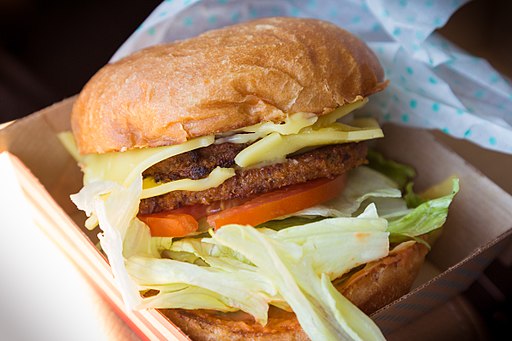Meatless Mondays Are Painless

The vegan Amy Burger at Amy’s Drive-Thru in Rohnert Park, California. Photo by Tony Webster. Amy’s Kitchen started in 1987 making organic and vegetarian frozen and convenience foods for sale in supermarkets around the country, and in 2105 opened the Rohnert Park restaurant, their first.
Replacing meat in the diet of the world’s people is enormously important, and probably the biggest single step toward ameliorating climate change other than reducing fossil fuel use, which would incidentally also be a byproduct of reducing livestock farming. Animal suffering would also be greatly relieved, because the situation now is horrific and getting worse as Americans and other Western peoples eat meat at least once a day, and in some places for every meal, and hundreds of millions people more in China and India aspire to the same relatively affluent lifestyles of Westerners. Factory farming of animals will become a larger industry still as the demand for meat goes up worldwide.
A scene from the 2002 film My Big Fat Greek Wedding, directed by Joel Zwick and written by Nia Vardalos, who also portrays the bride, with John Corbett as the groom. Eating meat is such an ingrained part of personal identity and social custom that most people give it little thought. Anyone who has ever been vegetarian or vegan, however, soon becomes aware of how others react to that news with bafflement or acceptance or, oddly, hostility, because refusal to eat meat is to such people a repudiation of their hospitality and identity, and possibly an indictment of their morality if the chief reason for not eating meat is because of animal suffering or the environment. It’s interesting that often the best way to smooth the ruffled feathers of meat eaters upset over learning of a vegetarian or vegan in their midst is to tout the health benefits of giving up meat, a reason that will usually gain their understanding and assent.
Consumers want more meat even though it’s not healthy for them. People will also eat more sugar than is good for them if they have the money and the opportunity. These are desires hard wired into human beings, and while some people can overcome them through will power however gained, most cannot, or even have a desire to try. For those people, the majority, give them a meat substitute at a comparable price to real meat, and satisfy their other needs for taste and nutrition and the most difficult need of all, but probably the most crucial, the carnivorous kernel in the brain that is the cause of all the social customs around eating meat or not eating meat, give those people that and the climate and the environment will be better for it, the animals all around the earth will be better for it, and those meat eaters themselves will be better for it, whether they understand and acknowledge it or not.
— Izzy 
